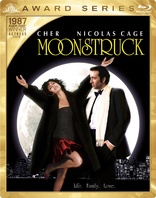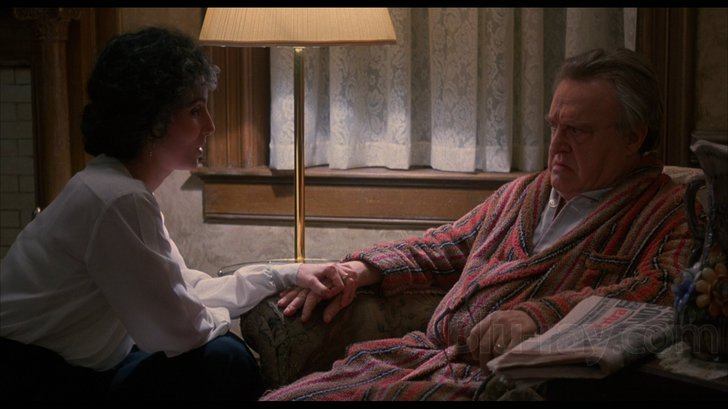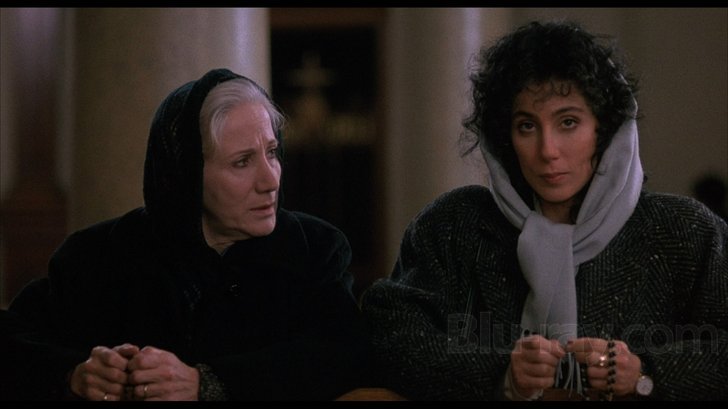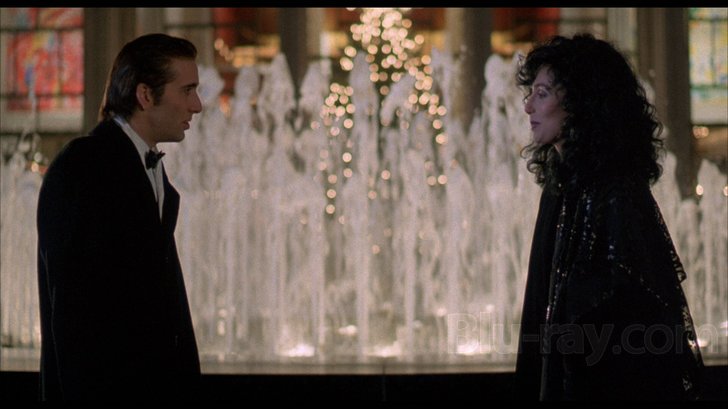Moonstruck Blu-ray Movie
HomeMoonstruck Blu-ray Movie 
Award SeriesMetro-Goldwyn-Mayer | 1987 | 102 min | Rated PG | Feb 15, 2011

Movie rating
7.4 | / 10 |
Blu-ray rating
| Users | 4.5 | |
| Reviewer | 4.5 | |
| Overall | 4.5 |
Overview
Moonstruck (1987)
A widowed Brooklyn book-keeper is torn between her fiancé and his brother.
Starring: Cher, Nicolas Cage, Vincent Gardenia, Olympia Dukakis, Danny AielloDirector: Norman Jewison
| Drama | Uncertain |
| Romance | Uncertain |
| Comedy | Uncertain |
Specifications
Video
Video codec: MPEG-4 AVC
Video resolution: 1080p
Aspect ratio: 1.85:1
Original aspect ratio: 1.85:1
Audio
English: DTS-HD Master Audio 5.1 (48kHz, 24-bit)
French: Dolby Digital 2.0
Spanish: Dolby Digital 2.0
Info obtained from disc.
Subtitles
English SDH, French, Spanish
Discs
50GB Blu-ray Disc
Single disc (1 BD)
Playback
Region free
Review
Rating summary
| Movie | 5.0 | |
| Video | 4.0 | |
| Audio | 3.5 | |
| Extras | 3.5 | |
| Overall | 4.5 |
Moonstruck Blu-ray Movie Review
"Snap Out of It!"
Reviewed by Michael Reuben July 26, 2011Moonstruck set the standard by which all subsequent tales of ethnic family life (other than mob stories) must be measured. Its successful blend of romance, drama, comedy and operatic fable has never been equaled, not that others haven't tried. (Raymond De Felitta's City Island was a worthy, if not fully realized, successor.) John Patrick Shanley's Oscar-winning script was unlike anything anyone had ever seen (and Shanley's subsequent attempts to replicate Moonstruck's odd mixture of passion and whimsy in The January Man and Joe Versus the Volcano foundered so badly that he largely abandoned Hollywood). Norman Jewison's Oscar-nominated direction looked so effortless that it's only when you step back and consider all the missteps Jewison avoided that you realize what a miracle he pulled off. Moonstruck won well-deserved acting Oscars for Olympia Dukakis and Cher. In those days, the diva and gay icon was a genuine actress with serious credits including Silkwood, Mask, The Witches of Eastwick and Suspect. In Moonstruck, Cher disappears into the part of Loretta Castorini, the no-nonsense Brooklyn bookkeeper who believes that love has passed her by, until one day it knocks her flat.

"I can't sleep any more. It's too much like death."
In an early scene, a man, Johnny Cammerari (Danny Aiello), proposes marriage to a woman, Loretta Castorini, at a popular Brooklyn restaurant called The Grand Ticino. (The restaurant was a real location in Manhattan where business doubled for several years after Moonstruck was released.) After some initial drama -- because in Moonstruck there is always drama -- Loretta accepts. Then Johnny leaves for Sicily to say farewell to his dying mother. Right away you have three of the four key elements in Moonstruck: Food. Family. Death. The fourth element has already been supplied during the title sequence, which features sets for Puccini's opera La Bohème being delivered and unloaded to the Metropolitan Opera. The fourth element is music -- grand music expressing primal emotions, bypassing rational thought. When the film was first previewed, the title sequence was accompanied by an opera score, and the results were disastrous. The audience shifted uncomfortably in their seats, thinking they'd been lured to an art film. Now Moonstruck begins with Dean Martin singing "That's Amore!", which strikes just the right note of enjoyment. For all the yelling and arguing that will occur in the next 100 minutes, the audience knows they're about to have fun. Loretta, the future bride, is the only member of her generation remaining in the Castorini household, a huge residence in Brooklyn that she shares with her parents and grandfather. She was married briefly to a husband who was killed in a bus accident, leading Loretta to conclude she has "no luck". Now she does the accounting for local businesses, including the market owned by her mother's brother, Uncle Raymond Capomaggi (Louis Guss), and his wife, Rita (Julie Bovasso, a Brooklyn native who taught accents to the entire cast and remained in demand as a dialect coach for the rest of her life). Loretta closed down her heart when her husband died, but she's been keeping company with Johnny even though she doesn't love him. Marriage at this point is a practical arrangement. Her mother, Rose (Olympia Dukakis), approves. "When you love 'em, they drive you crazy, 'cause they know they can", she tells Loretta, thinking of her own husband, Cosmo (Vincent Gardenia). A successful plumber who wears a suit and tie all day because he has employees doing the labor, Cosmo feels the weight of advancing years and has grown distant from his devoted wife. She suspects he's cheating. The senior Castorini generation is Cosmo's elderly father, known only as "Pops" or "Old Man" (Feodor Chaliapin Jr.). His interactions with family members consist more of gestures than words, and he prefers the company of his beloved pack of dogs, to which he chatters in a mixture of Italian and pidgin English. Pops walks his dogs night and day, sometimes meeting friends, sometimes howling at the moon with his canine companions. The film's plot is set in motion by a task that Johnny Cammarreri gives his new fiancée before departing for Sicily. Loretta has to see Johnny's brother, Ronny (Nicolas Cage), a baker, and invite him to the wedding. The brothers haven't spoken for years due to "bad blood" caused by . . . well, it's hard to explain. ("I ain't no freakin' monument to justice!" shouts Ronny.) Loretta tries to fulfill Johnny's task, but it takes only a few hours in the company of the intense and passionate Ronny when the unthinkable happens -- the two of them fall madly in love. (Shanley's original title for the film was "The Bride and the Wolf".)

Moonstruck Blu-ray Movie, Video Quality 

Viewers expecting a crisp, eye-popping image will be disappointed, and fans of Moonstruck will be grateful. The film has always had a soft, dreamy, "old world" look that cinematographer David Watkin (Out of Africa) carefully created. Any attempt to sharpen it for contemporary sensibilities would be a travesty. Fortunately, no such attempt has been made. Despite its softness, the image is finely detailed, revealing elements that have not been obvious on prior video versions. In one scene, for example, you can make out a gold-encased tooth in Loretta Castorini's mouth, though whether this belongs to the character or the actress is impossible to say. The worn decor of the Castorini household and the dungeon-like surroundings of Ronny's bakery are visible in a way they haven't been since the film played in theaters. The frequent presence of visible grain attests to the fact that fine detail has not been removed by the pernicious application of filtering. Black levels are sufficiently strong to give accurate renditions of the tuxedos worn by many of the men attending the opera. In many night scenes, the blacks aren't truly black, but this has less to do with "crushing" than with the fact that nights in a major city are never fully dark. The color scheme of Moonstruck tends toward the warm end of the spectrum, but most hues are muted, so that the occasional flash of vivid color stands out in contrast (e.g., the dress that Cosmo Castorini's mistress wears to the opera, which he reluctantly compliments as being "very . . . bright", or the interior of the liquor store where the proprietess accuses her husband of being "a wolf!"). The source material appears to be in good shape. Overall, while this is not a Blu-ray that will wow recent HD converts looking for crystalline ecstasy, those who appreciate accurate film transfers should be well satisfied.
Moonstruck Blu-ray Movie, Audio Quality 

Although the soundtrack is labeled 5.1, it might as well have remained in its original stereo, because there is little rear channel activity. Presented in DTS lossless, the sound is spread evenly across the front soundstage with occasional left and right panning effects. Where the track excels is in its reproduction of tiny details, such as the chirping of Ronny's parakeet during the crucial first conversations between Ronny and Loretta, and the crucial -- no, essential -- musical track that is as much a character in Moonstruck as any human. Whether it's Dean Martin's rendition of "That's Amore!" or key moments from La Bohème (for which the film sparked a national enthusiasm) or Dick Hyman's score knitted together from themes representing each main character, the soundtrack delivers the music with appropriate presence. The characters in Moonstruck may not open their mouths and sing (except for Uncle Raymond), but the emotions on display are the big ones that music is best suited to express.
Moonstruck Blu-ray Movie, Special Features and Extras 

The features have been ported over from the 2006 "deluxe edition" DVD. The only omitted feature is the set of recipe cards included inside the DVD case, which would not have fit within the smaller Blu-ray packaging. The Blu-ray adds a trailer, which was not part of the DVD's features. Fox has utilized the same crippled design that is now familiar from all of its MGM discs: no main menu; BD-Java that delays loading times without being utilized for any advanced features; no bookmarking. It's almost as if the people designing these discs at Fox want to be sure that purchasers of MGM catalogue titles experience all the worst aspects of Blu-ray.
- Commentary with Actress Cher, Director Norman Jewison and Screenwriter John Patrick Shanley: The three participants were recorded separately and edited together. As a result, there is almost no "dead air", and the track is lively and informative. Although no additional voice is heard until briefly near the end, it becomes obvious as the track progresses that an interviewer sat with the participants while they spoke and, at key points, prompted their recollections, sometimes using accounts of what the other commentators had said. The commentary is essential listening for any Moonstruck fan, because it's a goldmine of inside information. The project was the happy marriage of a playwright who was a first-time screenwriter with an experienced film director who approached the script like a play. Indeed, when Jewison reached the very tricky concluding sequence, where all the characters gather in the Castorini kitchen and events pile upon each other ("like a Feydeau farce", as Jewison says), the director dismissed the crew and rehearsed the cast as if for a stage production -- and only when their timing had been perfected did he decide where he wanted to put the camera. Jewison says it's the most difficult scene he ever shot on any film (and that includes big musicals like Fiddler on the Roof). Cher has her own stories to tell about the closing sequence, most of which involve Nicolas Cage, for whom she had lobbied to play Ronnie over the studio's strenuous objection. (This was when Cage was an oddball young actor and not the eccentric repetitive movie star he is today.) Cher also provides an interesting account of the film's lukewarm release by MGM, which initially put its marketing muscle behind Overboard, and only backed Moonstruck when the former film failed to catch on. Shanley adds much local and autobiographical detail, but his single most interesting contribution is a description of his original ending, which was never shot. It would have involved a trip to confession and penance in a men's shelter. Thematically and on the page, what Shanley describes must have made a lot of sense, but it would have been deadly on screen.
- Moonstruck: At the Heart of an Italian Family (SD; 1.78:1, enhanced; 25:30): This is a breezy documentary made in 2006 with contemporary interview footage from Jewison (who repeats many of the stories from his commentary), Shanley (likewise), Mahoney, Aiello, Dukakis and production designer Phil Rosenberg. Contemporary interview footage from 1987 provides comments from Cher, Cage, Gardenia and Bovasso. Just enough glimpses of the cast and crew in rehearsal and on set are included to make you wish there were more. For some reason, the makers of the documentary thought that it would be valuable to include interviews with "real" Italian couples (the word "real" is in quotes, because there's no indication of where these people are from or how they were selected), whose purpose seems to be to vouch for the authenticity and typicality of the behaviors and attitudes represented in Moonstruck. The film doesn't need any such corroborating evidence. Like all great works of art, it's self-authenticating.
- Pasta to Pastries: The Art of Fine Italian Food (SD; 1.78:1, enhanced; 30:07): Hosted by Mark DeCarlo, this collection of featurettes created for the 2006 DVD provides a culinary tour of New York's Little Italy. While it's a perfectly fine program for something like the Food Network, it's a stretch for Moonstruck.
- Music of Moonstruck (SD; 1.78:1, enhanced; 6:24): Jewison and others discuss the soundtrack. The real gem of this featurette is the interview with composer Dick Hyman, in which he discusses breaking down Puccini's score for La Bohème to extract themes for each of the main characters. Hyman has a wonderful dry wit; he suggests that Puccini should receive a credit on the film and notes that he was a great collaborator who never caused a problem.
- Theatrical Trailer (HD; 1:52): It is possible to capture the spirit of an unusual film in a trailer, and this one did it.

Moonstruck Blu-ray Movie, Overall Score and Recommendation 

Moonstruck derives from a mind set for which the greatest special effect is an actor giving an interesting performance and a director's main job is to cast the right actors and orchestrate a seamless ensemble. Few have done this as well, and no one has ever done it better, than Norman Jewison in Moonstruck. The film remains as fresh today as when it was released, even now when much of the neighborhoods it depicts has been knocked down and turned into condos. We can still enter its vibrant world to share great meals (and more) with the Castorinis, Cappomaggis and Cammareris. No matter how many times someone says, "I don't want to talk about it!", they're always there, still talking.
Other editions
Moonstruck: Other Editions
Similar titles
Similar titles you might also like

Arizona Dream
1993

Breakfast at Tiffany's
1961

New York, I Love You
2009

Midnight in Paris
2011

Greenberg
2010

Tootsie
1982

Third Person
2013

A Room with a View
1985

You're a Big Boy Now
Warner Archive Collection
1966

Vicky Cristina Barcelona
2008

Up in the Air
2009

From the Terrace
Limited Edition to 3000
1960

The Brothers McMullen
Filmmakers Signature Series
1995

Sideways
10th Anniversary Edition
2004

When Harry Met Sally...
30th Anniversary Edition
1989

Hannah and Her Sisters
The Woody Allen Collection
1986

Love with the Proper Stranger
1963

Last Chance Harvey
2008

Millie
1931

The Lords of Flatbush
1974



